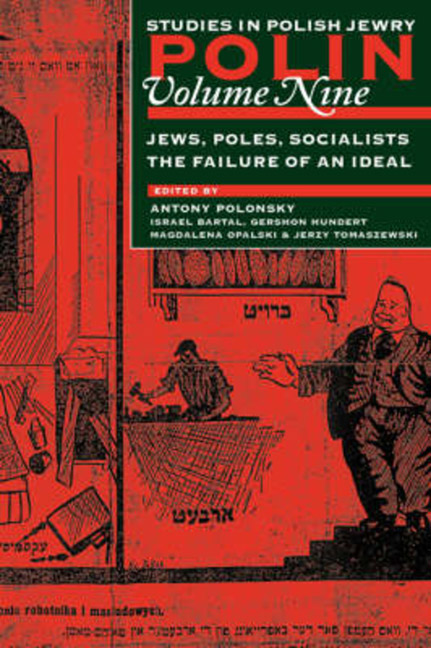Book contents
- Frontmatter
- Dedication
- Editors and Advisers
- Preface
- Acknowledgement
- Polin
- Polin: Studies in Polish Jewry
- Contents
- Note on Transliteration, Names, and Place Names
- Abbreviations
- Introduction
- PART I POLES, JEWS, SOCIALISTS: THE FAILURE OF AN IDEAL
- Jewish Socialists in the Kingdom of Poland
- The Jewish Problem in Polish Socialist Thought
- The Relation of the Polish Socialist Party: Proletariat to the Bund and the Jewish Question, 1900-1906
- The Jews, the Left, and the State Duma Elections in Warsaw in 1912: Selected Sources
- Jews and the Russian Revolution: A Note
- The Bund in Poland, 1935-1939
- Łodź Remained Red: Elections to the City Council of 27 September 1936
- The Jews of Vilna under Soviet Rule, 19 September-28 October 1939
- The Polish Underground and the Extermination of the Jews
- The Jewish Underground and the Polish Underground
- The Pogrom in Kieke on 4July 1946
- Antisemitism in Poland in 1956
- PART II NEW VIEWS
- PART III REVIEWS
- REVIEW ESSAYS
- BOOK REVIEWS
- Bibliography Of Polish-Jewish Studies, 1993
- Notes on Contributors
- Notes on Translators
- Glossary
- Index
Jews and the Russian Revolution: A Note
from PART I - POLES, JEWS, SOCIALISTS: THE FAILURE OF AN IDEAL
- Frontmatter
- Dedication
- Editors and Advisers
- Preface
- Acknowledgement
- Polin
- Polin: Studies in Polish Jewry
- Contents
- Note on Transliteration, Names, and Place Names
- Abbreviations
- Introduction
- PART I POLES, JEWS, SOCIALISTS: THE FAILURE OF AN IDEAL
- Jewish Socialists in the Kingdom of Poland
- The Jewish Problem in Polish Socialist Thought
- The Relation of the Polish Socialist Party: Proletariat to the Bund and the Jewish Question, 1900-1906
- The Jews, the Left, and the State Duma Elections in Warsaw in 1912: Selected Sources
- Jews and the Russian Revolution: A Note
- The Bund in Poland, 1935-1939
- Łodź Remained Red: Elections to the City Council of 27 September 1936
- The Jews of Vilna under Soviet Rule, 19 September-28 October 1939
- The Polish Underground and the Extermination of the Jews
- The Jewish Underground and the Polish Underground
- The Pogrom in Kieke on 4July 1946
- Antisemitism in Poland in 1956
- PART II NEW VIEWS
- PART III REVIEWS
- REVIEW ESSAYS
- BOOK REVIEWS
- Bibliography Of Polish-Jewish Studies, 1993
- Notes on Contributors
- Notes on Translators
- Glossary
- Index
Summary
ONE of the most disastrous consequences of the Russian Revolution was the identification of Jews with Communism. It was partly caused by the sudden appearance of Jews in positions and in places where they had never been seen before. The perception was reinforced and given a spurious theoretical underpinning by the so-called Protocols of the Elders of Zion, a forgery which in the years immediately following the Revolution gained great popularity in Russia and elsewhere, notably Germany. The book accused Jews of seeking, through various devious means, to conquer and subjugate Gentile society. After 1918 Communism was widely interpreted as one of the devices world Jewry used to achieve its purported aims.
In view of the role this accusation had in paving the way for the mass destruction of European Jewry, the question of Jewish involvement in Bolshevism is of more than academic interest: for it was the allegation that ‘international Jewry’ invented Communism as an instrument with which to destroy Christian (or ‘Aryan’) civilization that provided the ideological and psychological foundation of the Nazi ‘final solution’. Fantastic disinformation spread by Russian extremists alleged that all the leaders of the Soviet state were Jews. Many foreigners involved in Russian affairs came to share this belief. Thus, Major-General H. C. Holman, the head of the British military mission to Denikin, told a Jewish delegation that of thirty-six Moscow commissars only Lenin was a Russian, the rest being Jews. An American general serving in Russia was convinced that the notorious Chekists M. I. Latsis and la. Kh. Peters, who happened to be Latvians, were Jewish as well. Sir Eyre Crowe, a senior official in the British Foreign Office, responding to Chaim Weizmann's memorandum protesting against the pogroms, observed ‘that what may appear to Mr. Weizmann to be outrages against Jews, may in the eyes of the Ukrainians be retaliation against the horrors committed by the Bolsheviks who are all organized and directed by the Jews’. For some Russian Whites, anyone who did not wholeheartedly support their cause, whether Russian or Western, including President Wilson and Lloyd George, was automatically presumed to be a Jew.
- Type
- Chapter
- Information
- Jews, Poles, Socialists: The Failure of an Ideal , pp. 55 - 57Publisher: Liverpool University PressPrint publication year: 2008



